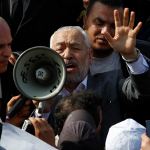 On Tuesday, The Cable blog of Foreign Policy magazine posted an entry, "Inside the Obama Team's 'Shift' on Syria". In fact, there was little of substance on current US policy --- far more interesting was this revelation, tucked away halfway down the article:
On Tuesday, The Cable blog of Foreign Policy magazine posted an entry, "Inside the Obama Team's 'Shift' on Syria". In fact, there was little of substance on current US policy --- far more interesting was this revelation, tucked away halfway down the article:
"A lot of people were wrong. The general assessment [inside the administration] was that this wouldn't happen, that Assad was too good at nipping these movements in the bud and also that he was not afraid to be brutal," one administration official said. "All of these things combined made this more of a surprise and made it much harder to deal with."
For the first three weeks of the protests, the analysts told the policy makers that it was unclear whether the opposition had wide support throughout the country and whether the protest movement would be able to sustain itself and grow.
"Then, gradually, every day we saw the protests get larger, and we realized this is going to get worse and that [Assad] wasn't going to listen to anyone else," the official said, explaining the administration's recent stream of increasingly harsh condemnations of the Syrian government's actions. "It was a reaction to the events on the ground."
 Armed security officers wearing balaclavas led Nasser Abul, blindfolded and shackled, into a courtroom in downtown Kuwait City on July 19. Accused of crimes against the state, he answered the judge's questions from a wood-and-metal cage in the courtroom. His mother, watching the proceedings, hoped her 26-year-old eldest son would finally be released after nearly two months in detention. The judiciary has refused to grant her wish.
Armed security officers wearing balaclavas led Nasser Abul, blindfolded and shackled, into a courtroom in downtown Kuwait City on July 19. Accused of crimes against the state, he answered the judge's questions from a wood-and-metal cage in the courtroom. His mother, watching the proceedings, hoped her 26-year-old eldest son would finally be released after nearly two months in detention. The judiciary has refused to grant her wish.
 Friday, August 26, 2011 at 8:46
Friday, August 26, 2011 at 8:46







